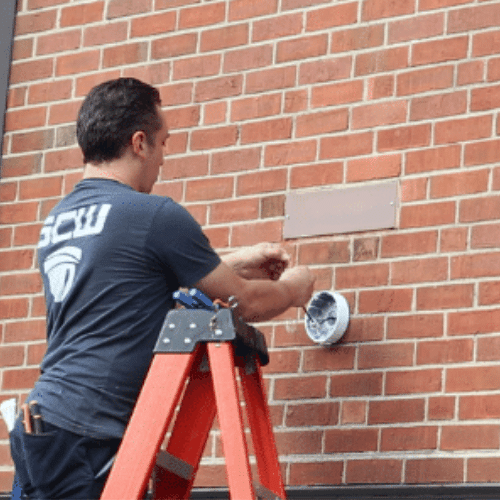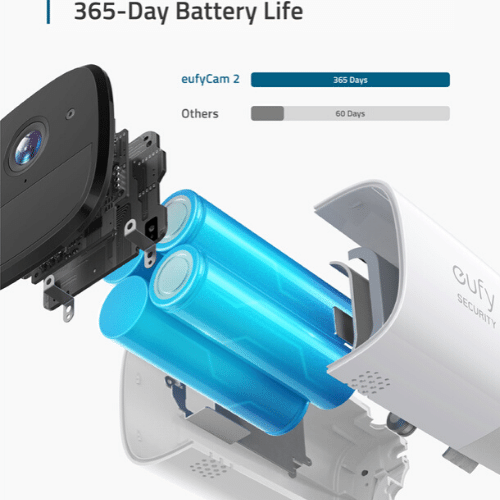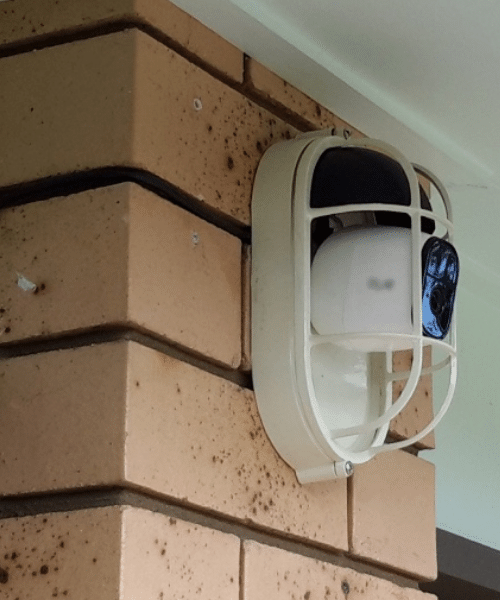Wire-Free, Battery Powered Security Cameras : Pros and Cons
Wifi cameras are misunderstood: while great for homeowners, they are terrible for business problems.
Wifi and battery powered wire-free cameras have always been a technology that never seemed to deliver on what they promised for business uses, but wifi cameras have been soaring in popularity with homeowners.
If you've hit this page because you're trying to decide which system is the right one for you, take a look at the pros and cons of each system and why these pros and cons work for homeowners but fail for business use.

Installation
Although, it is certainly possible to install a wired system yourself, there are many wired security camera projects that need professional installation.
Wire free cameras are certainly easier to install, usually taking only takes about five minutes.
This is the major benefit of going with a wire-free system.

Battery Life and the Refractory Period
Having a battery is also the biggest drawback of a wire free camera. Most wire free cameras have a very low power PIR motion sensor that only records when motion is detected.
A low powered motion detector means that it has to be close range, as range increases power consumption. When motion is detected, the camera needs to wake up and start recording, which can create a video of the person leaving rather than coming - often only recording the back of someone's head.
Wire-free cameras also needs a way to filter out repetitive motion triggers, so that a homeowner having a coffee on their front porch or pulling weeds in the front yard doesn't drain the battery in one go. So, wire-free camera developers created the "refractory period." The refractory period is the delay from one motion event to another where the camera will not record - even if there is still motion or new motion. Some wire-free camera lets the user control this setting and some do not.

Intrusion and Other Use Cases
Home security cameras need to do one thing: let the homeowner know when a person is on their property. In the security industry, we refer to this as "Intrusion Protection," and wire free actually do this rather well.
Business security cameras need to solve many more problems. Yes, they need to detect unwanted visitors, but they also need to solve for vandalism, shrinkage, asset protection, liability reduction, and HR problems. Businesses often have semi-trusted individuals that need to be observed the entire time that they are present: retailers need to make sure potential shoppers aren't actually shoplifters, HR managers need to collect video evidence to review if there's an HR complaint, warehouse managers need to track inventory that warehouse workers ship, bankers need to check deposit and withdraw records with video documentation, facilities needs to confirm that no water leaks are occurring, plant managers need to make sure that machinery is running correctly, etc.
A refractory period would be catastrophic for most business uses.
Physical Security
If physical security is your biggest concern, you'll want to go with a wired system because it's extremely difficult to steal a wired-in security camera system.
A wire-free camera, on the other hand, is usually secured to the wall with nothing more than a magnetic mount. Most wireless (also known as "stick up") cameras come with simple, magnetic bases. While these magnetic bases are slick and easy to install, they offer zero protection against anyone hitting the cameras or merely taking the cameras as there is no locking mechanism in place.
One of the hard truths of physical security is that there's a balancing act between convenience and ease of installation and security. Wireless cameras teeter the scales on the far end of the ease of install with virtually no physical security.


Live View Delays
SCW wired systems have little to no delay - you can also view your cameras live on a monitor or TV using the HDMI output 24/7.
Wire-free systems have some sort of delay, as the camera has to wake up from sleep mode before it can start recording. We tested several of the most popular brands on the market, and it took anywhere from 3-10 seconds to activate the camera. Even when the video came, it had still had a 3-10 second delay from what was happening realtime to what was seen on live view. If live viewing is a feature that matters a lot to you, then we recommend wired cameras.
Video Quality
Resolution doesn't matter as much as your ability to updated that resolution. We cover this problem in our IP Camera Bitrate And Compression: Not All Same Resolution Cameras Have the Same Resolution guide. To quickly summarize that problem, resolution technically refers to the maximum possible pixels in a still image in a video, while bitrate refers to the speed in which you can update those pixels. A camera with a high resolution sensor but a low bitrate processor will only be able to update some of those pixels each frame. This means that although a camera (in this case the image sensor) might technically be 1080p or 4K, it only can record high motion video at 1/8 of that resolution or update 1/8 of the view per frame (because the processor isn't capable of 4K video production). This problem is quite common with battery powered cameras, as the faster processors needed to update more pixels at once use more power. In order to get great battery life, you have to reduce processor speed and this means that then you can't update all the image at the same time.
Notice how the head of the person in this image has been cut off? The low bitrate (and low power consumption) processor in this camera ran out of processing power and just didn't update that part of the image.


Internet Required
With SCW wired systems, you don't need the internet for any operation other than for sending alerts or watching remotely. Your system can be managed directly from the unit.
It your internet is cut by potential thieves, a SCW system will still record. You can still playback footage, and download locally without an internet connection.
Most wire-free systems require internet access to view footage - they cannot be viewed locally. Even more concerning is that if the internet is out, some models will not record at all, as many do not have any internal storage.
Just Getting Started with Security Cameras?
Get the SCW Beginner Guide!
New to security camera systems? Confused by Analog vs IP? Bullet vs Dome? Indoor vs Outdoor? Don't even know what PTZ means?
No problem! Download the SCW Beginner Guide and get all your questions answered right away!

